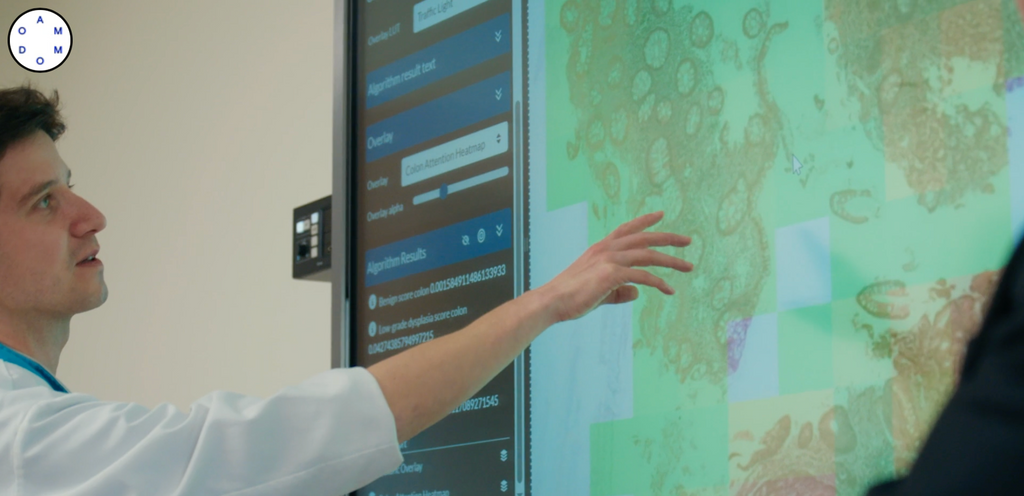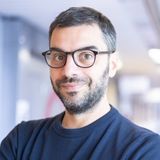
Background
Microscopic assessment of histological tissue sections by pathologists is one of the cornerstones of diagnostics and of treatment decision making for patients. Every day, pathologists are tasked with detecting and classifying tissue patterns indicating presence of specific diseases, visually estimating the proportion of certain types of patterns to derive biomarkers, and with producing a textual report of their findings and their final diagnosis. This workload is steadily increasing due to the rise of disease incidences and an aging population, while at the same time the number of pathologists decreases and visual inspection is hampered by substantial inter-observer variability.
Task-specific Machine learning (ML) based on image analysis has already shown that it can support pathologists by improving their diagnostic performance and efficiency. Based on task- and application-specific developments, most of these “narrow” ML applications allow to “go from A to B”, replicating what humans can do. However, they often lack characteristics of robustness to out of distribution and out of domain data, transparency, interpretability, and do not exploit the wealth of multi-modal data (e.g., images and text) in pathology.
You will join the Computational Pathology Group to work on a project funded by the AMMODO Science Award for Groundbreaking Research, to address the aforementioned gaps by developing large multi-modal foundation models for digital pathology. You will use techniques of self-supervised learning, vision transformers for image analysis and natural language processing, and large-scale multi-modal digital pathology data, to build AI models that could act as co-pilots for pathologists. You will investigate efficient approaches to train and use these models leveraging the wealth of whole-slide images and textual data available in clinical settings, and validate the methodology in clinical scenarios and in the largest dataset of oncological whole slide images in the world.
Tasks and responsibilities
- Work with self-supervised learning techniques to build large multi-modal foundation models with visual question-answering capabilities.
- Integrate language and image models to produce interpretable AI-generated textual output in the form of description of morphological features and clinical reports.
- Join a team within the computational pathology group with specific focus on foundation models.
- Collaborate with pathologists and (inter)national researchers to validate your developed algorithms in large cohorts.
- Have fun interactions with colleagues, present at local and (inter)national conferences, and develop yourself as an independent researcher.
Profile
You are a creative and ambitious researcher with an MSc degree in Computer Science, Data Science, Engineering, Technical Medicine, Biomedical Sciences or similar, with a clear interest in artificial intelligence and medical image analysis. Good communication and organizational skills are essential. Experience with deep learning and programming, preferably in Python, should be evident from the (online) courses you've followed, your publications, GitHub account, etc. Experience with foundation models and AI agents is a plus.
We offer
- An exciting position in one of Europe's largest research groups in Computational Pathology, embedded within the department of Pathology of the Radboudumc.
- An international work environment with an informal atmosphere.
- 4-year contract of 36 hours per week (full time).
- Salary scale 10A.
- An annual vacation allowance of 8% and you will receive an end-of-year bonus of 8.3%.
- 172 vacation hours (over 23 days) per year (as of 1 January 2025, you will receive 176 vacation hours).
- 70% coverage of the pension premium by Radboudumc. You pay the rest of the premium with your gross salary.
- A discount on health insurance.
Organisation
The Computational Pathology Group (CPG) is a research group of the department of Pathology of the Radboud University Medical Center (Radboudumc). The group develops, validates and deploys novel medical image analysis methods, usually based on the newest advances in machine learning with a focus on computer-aided diagnosis (CAD). Application areas include diagnostics and prognostics of breast, colon, prostate and lung cancer. Our group is among the international front runners in the field, witnessed for instance by the highly successful CAMELYON, PANDA and TIGER grand challenges which we organized. The CPG is also part of the cross-departmental Diagnostic Image Analysis Group (DIAG) at Radboudumc, with researchers in the departments of Radiology and Nuclear Medicine, Pathology, Cardiology, Radiotherapy and Neurology.
Employment conditions
Upon commencement of employment we require a certificate of conduct (Verklaring Omtrent het Gedrag, VOG) and there will be, depending on the type of job, a screening based on the provided cv. Radboud university medical center’s HR Department will apply for this certificate on your behalf.
Read more about the Radboudumc employment conditions and what our International Office can do for you when moving to the Netherlands.
Application
To apply for this PhD vacancy, follow the official application procedure at this link. Apply before December 9, 2024. Invitations for job interviews will be sent starting from December 13.


